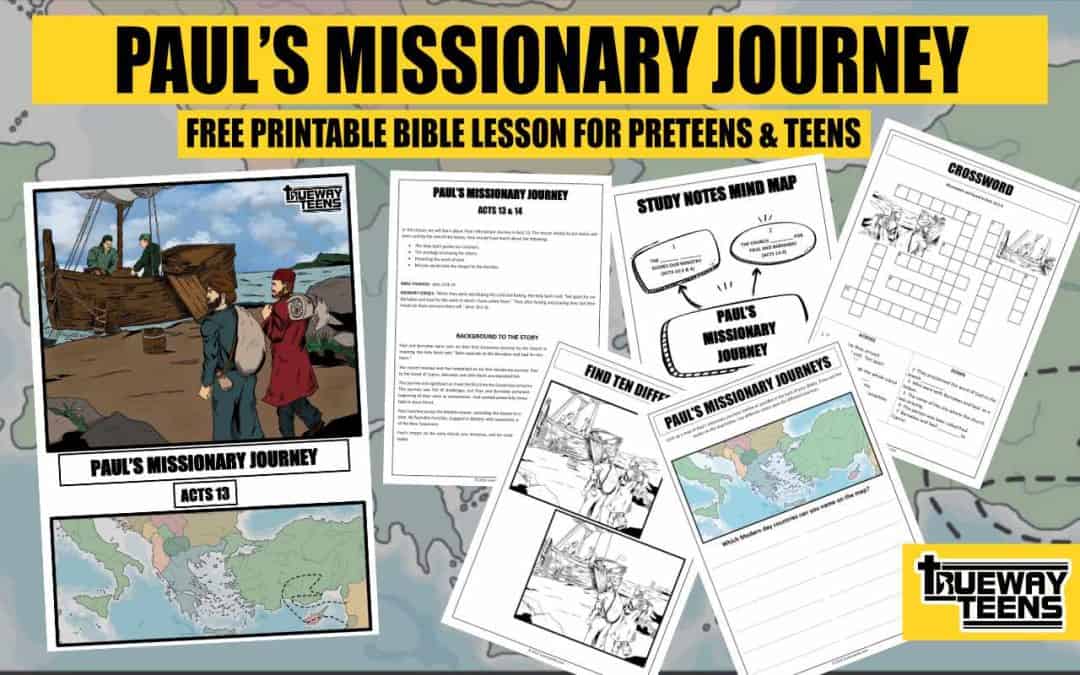In this lesson, we will learn about Paul’s Missionary Journey in Acts 13. This lesson relates to pre-teens and teens and by the end of this lesson, they should have learnt about the following:
- The Holy Spirit guides our missions.
- The privilege of praying for others.
- Preaching the word of God
- Mission works take the Gospel to the Gentiles.
BIBLE PASSAGE: Acts 13 & 14
MEMORY VERSES: “While they were worshiping the Lord and fasting, the Holy Spirit said, “Set apart for me Barnabas and Saul for the work to which I have called them.” Then after fasting and praying they laid their hands on them and sent them off.” (Acts 13:2-3).
DOWNLOAD THE FREE PRINTABLE LESSON

BIBLE STUDY NOTES FOR TEENS
Paul and Barnabas were sent on their first missionary journey by the church at Antioch. During a prayer meeting, the Holy Spirit said, “Now separate to Me Barnabas and Saul for the work to which I have called them.”
The church listened and Paul embarked on his first missionary journey. Paul’s first missionary journey was to the island of Cyprus. Barnabas and John Mark accompanied him.
This journey was significant as it was the first time the Gospel was preached beyond the boundaries of Judea. This journey was full of challenges, but Paul and Barnabas persevered. This first journey was just the beginning of their work as missionaries. God worked powerfully through them, and many people came to faith in Jesus Christ.
Paul travelled across the Mediterranean, spreading the Gospel to some of the most influential cities of the time. He founded churches, engaged in debates with opponents, and wrote letters that would become part of the New Testament.
Paul’s impact on the early church was immense, and his missionary work continues to be a model for us today.
KEY POINTS FROM THE PASSAGE
1. THE HOLY SPIRIT GUIDES OUR MINISTRY (ACTS 13:2 & 4)
The word “missionary” comes from the Latin word “missio” which means “to send with a message.”
In Acts 13:2 “the Holy Spirit said, Now separate to Me Barnabas and Saul for the work to which I have called them” and verse 4 says, “So, being sent out by the Holy Spirit, they went down to Seleucia.”
The church prayed and sent Paul and Barnabas, but it was under the Holy Spirit’s direction. We need the Holy Spirit to direct our ministry.
We live in a world that is constantly changing. It can be hard to know which direction to go in. We must learn to wait on God for leading and direction. When we wait on God, we are putting our trust in Him that He will guide us and lead us to where we can serve Him best.
When we allow the Holy Spirit to guide us, we open ourselves up to God’s plan for our lives. The Holy Spirit will give us the wisdom, strength, and courage we need. Like Paul, we need to be willing to follow His guidance, even when it’s not easy. When we do, we can be confident that we are living out God’s plan for our lives.
2. THE CHURCH PRAYED FOR PAUL AND BARNABAS (ACTS 13:3)
Before they left on their mission trip, the early church prayed for Paul and Barnabas. They recognized their calling and supported them in it.
We are called to pray for those in ministry. This includes missionaries, who are often working in difficult and dangerous circumstances. We should be praying for their safety, their effectiveness in ministry, and their personal needs.
Praying for missionaries is a way to support them in their work and to show them that we care about them. It is also a way to stay connected to what God is doing around the world. When we pray for missionaries, we join God in His work of spreading the Gospel to the ends of the earth.
Missionaries often send prayer letters to update others on their work and ask for specific prayers. It is estimated that over 400,000 missionaries are serving in over 200 countries worldwide, so there is no shortage of people to pray for. Take some time to connect with a missionary and commit to praying for them.
3. THEY PREACHED THE WORD OF GOD (ACTS 13:5)
Paul and Barnabas understood that preaching the word of God was the most important task in their mission work. The Bible says, “And when they arrived in Salamis, they preached the word of God in the synagogues of the Jews. They also had John as their assistant” (Acts 13:5).
Paul and Barnabas didn’t start with sightseeing or making friends (which is not bad), but they were dedicated to the work the Holy Spirit gave to them.
The Gospel has the power to change lives and bring people into a saving relationship with Jesus Christ. We must be faithful in proclaiming it in both word and deed.
Paul later wrote to the church in Rome, “How then will they call on him in whom they have not believed? And how are they to believe in him of whom they have never heard? And how are they to hear without someone preaching?” Romans 10:14
The priority in missions should be the word of God. Only God’s word is capable of touching and transforming lives.
The Gospel is the power of God for salvation (Romans 1:16). It is the only thing that can truly change a person’s heart and give them eternal life.
4. THE GOSPEL IS FOR ALL PEOPLE (ACTS 13:44-14:7)
The Gospel is the good news that Jesus Christ came to save sinners. It is the power of God for salvation to everyone who believes (Jew and Gentile alike).
In the Bible, the word Gentiles refers to all non-Jewish people. God called Abraham and the Jewish people to be set apart for Him. The Jewish people in Jesus’ and Paul’s time were keenly aware of the differences between themselves and the Gentile nations around them.
There were many strict rules about how Jews were to interact with Gentiles. For example, they were forbidden from eating with them, marrying, or even touching them. This separation was intended to protect the Jewish people from being led astray by Gentile ways.
There was also general mistrust and suspicion of Gentiles. Jews were often held captive by Gentiles (Such as the Roman and Babylon rule) and mistreated.
Paul understood that Jesus offered salvation for all people. He wrote, ‘For I am not ashamed of the gospel, because it is the power of God that brings salvation to everyone who believes: first to the Jew, then to the Gentile.’
We are to share the Gospel with all people, regardless of their background, culture, or beliefs.
There are lots of people who are very different to us in our streets, cities and schools. It can be hard to talk to people when we don’t have much in common, but they need to hear the Gospel. We have the privilege of sharing the Gospel with people who may have never heard the truth about Jesus. Paul knew that the Gentiles needed the Gospel just as much as the Jews did. They were just as lost and in need of a Saviour.
CONCLUSION
Paul’s missionary journey took the Gospel to the Gentiles. After his first missionary journey, he continued on two other trips before his final journey to Rome. Paul never stopped taking the Gospel to people.
Today, we are still called to share the Gospel. Whether at home or on the opposite side of the world, people need to know Jesus. We should pray and support those who have been sent while we continue to share the Gospel with those around us.
YOUTH GAMES AND ACTIVITIES FOR PAUL’S MISSIONARY JOURNEY
I WENT ON A JOURNEY AND I SAW…
- Sit players in a circle. You can even play this game with two people.
- The first player says, “I went on a journey, and I saw (ITEM 1),”
- The second player must then say, “I went on a journey and I saw (ITEM 1) and (ITEM 2).”
- Each player adds one new item.
- Players must remember all previous items and add their own. If they forget any, they are out of the game.
LOCAL MISSION TRIP
- A mission trip doesn’t need to be on the other side of the world.
- Arrange a local mission trip with your youth group, family, or friends to help in a local Christian ministry for a day or weekend.
- Do your research beforehand and see what others have done in the past.
- Make a list of ways you can be a witness for God in your local area.
- Commit the trip in prayer.
SOAP SAILBOAT
- You will need: small bars of soap, a spoon for carving, toothpicks, bits of paper, glue.
- (Look at reference book or Bible dictionary to see pictures of boats used in the first century. Some of these may be similar to the boat that carried Paul on his first missionaries’ journeys.)
- Give the child a spoon to carve the soap into a boat shape.
- Add sails using white paper, toothpicks, and glue.
- Place in water to check that it floats.
Free printable Teen Worksheets in the lesson pack
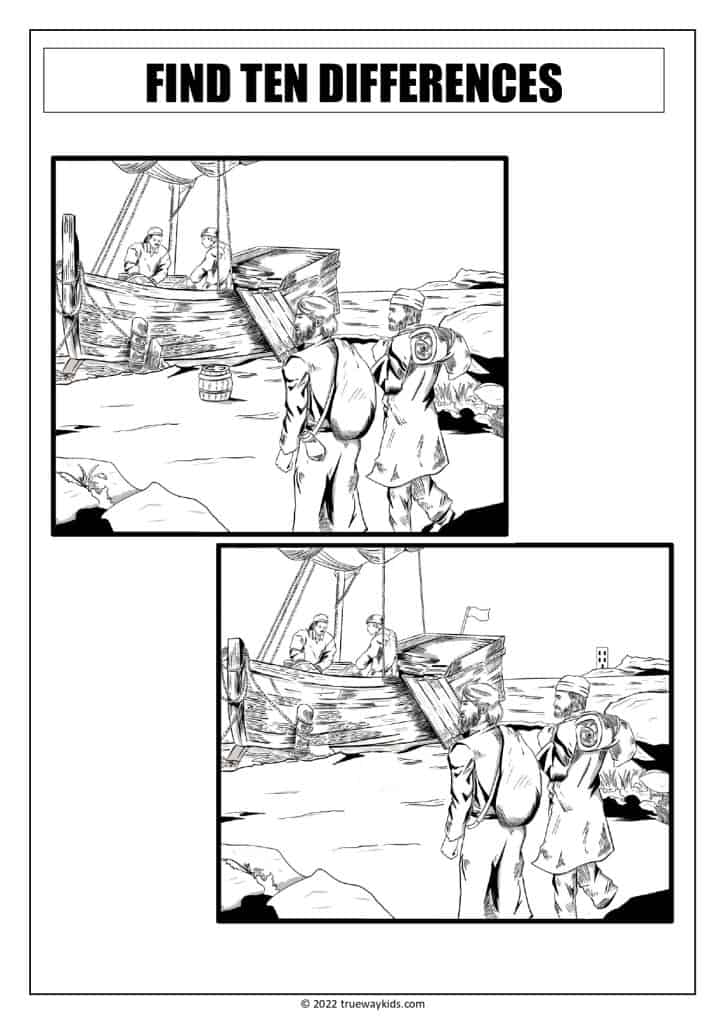
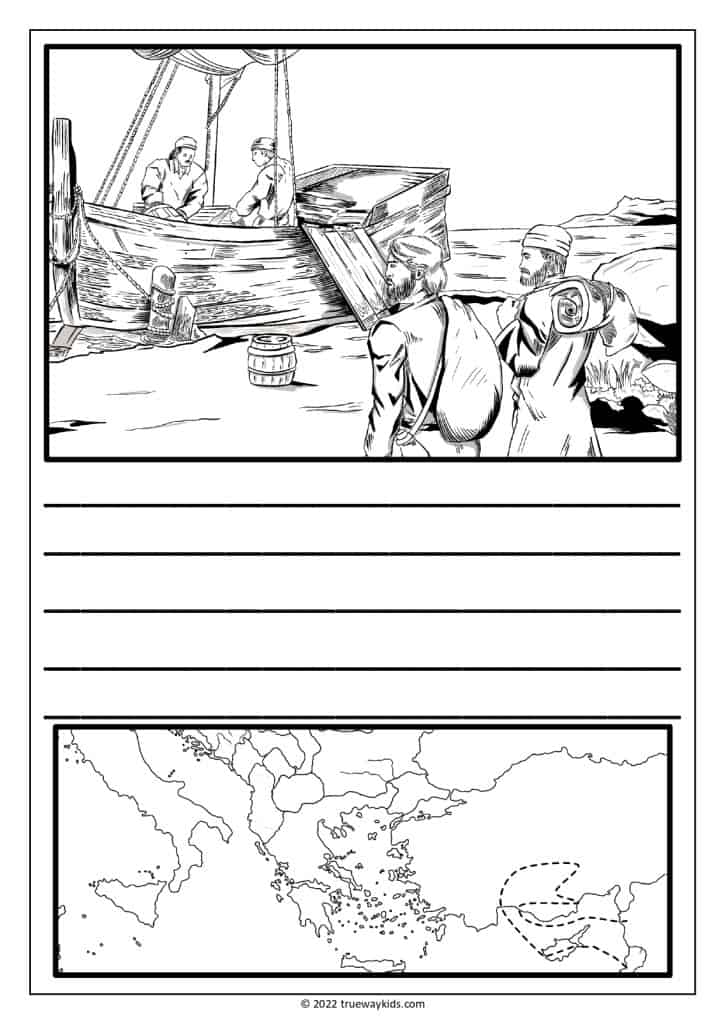
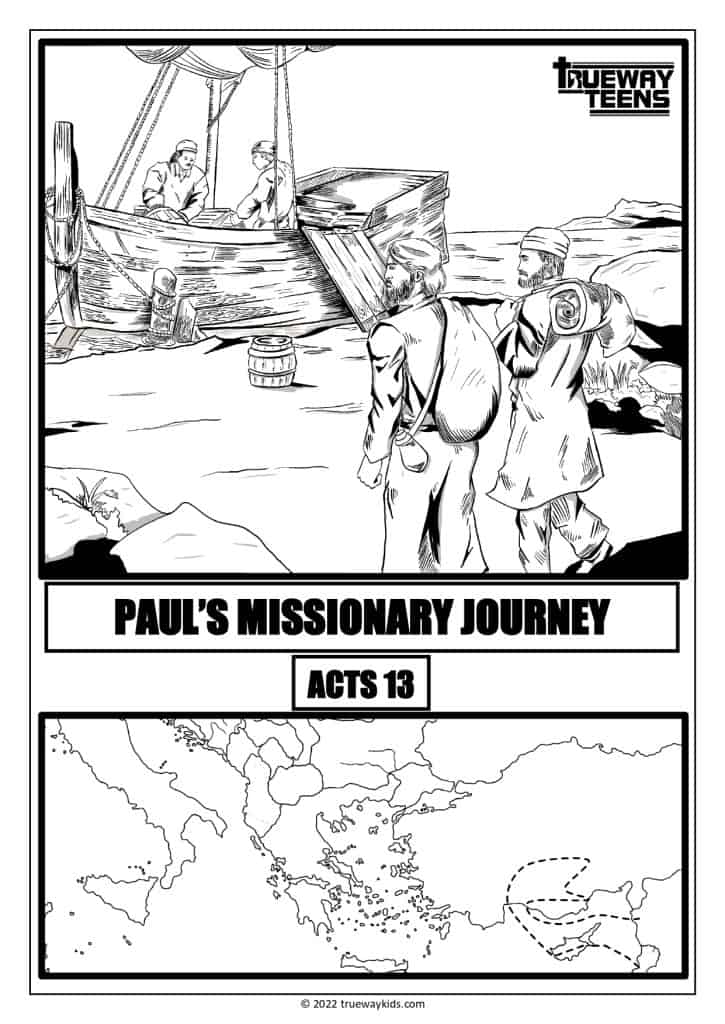
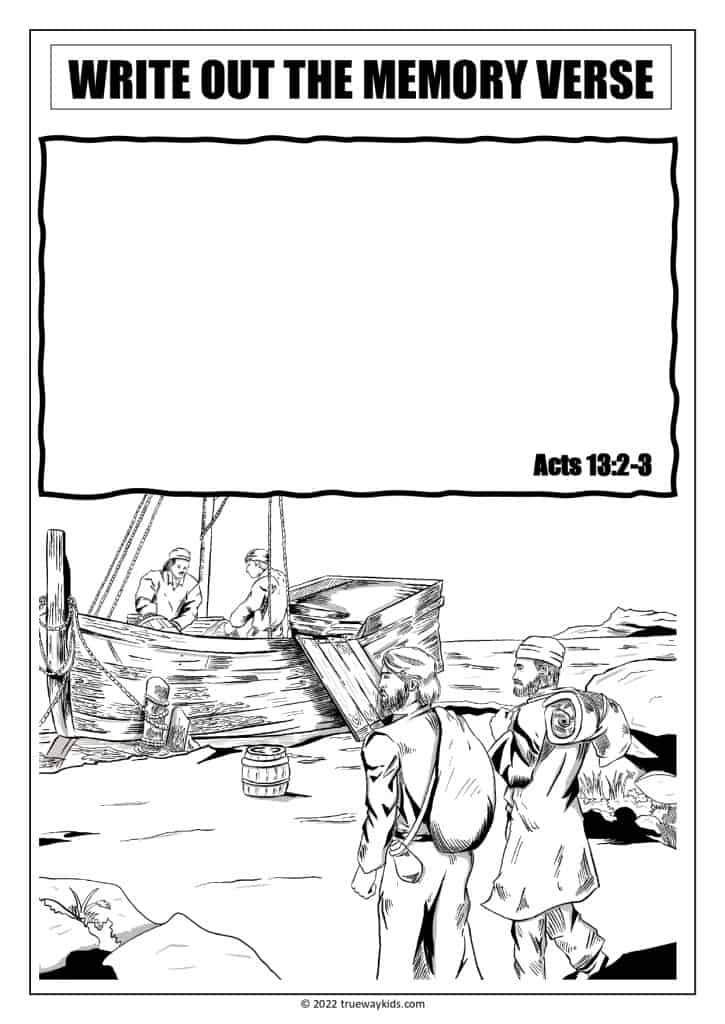
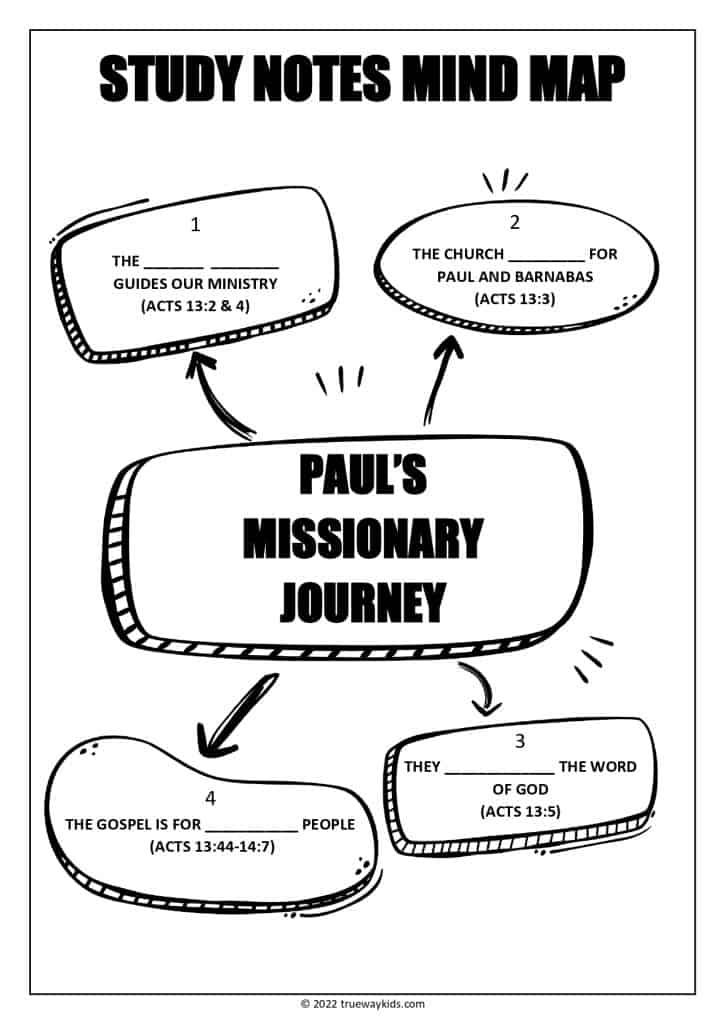
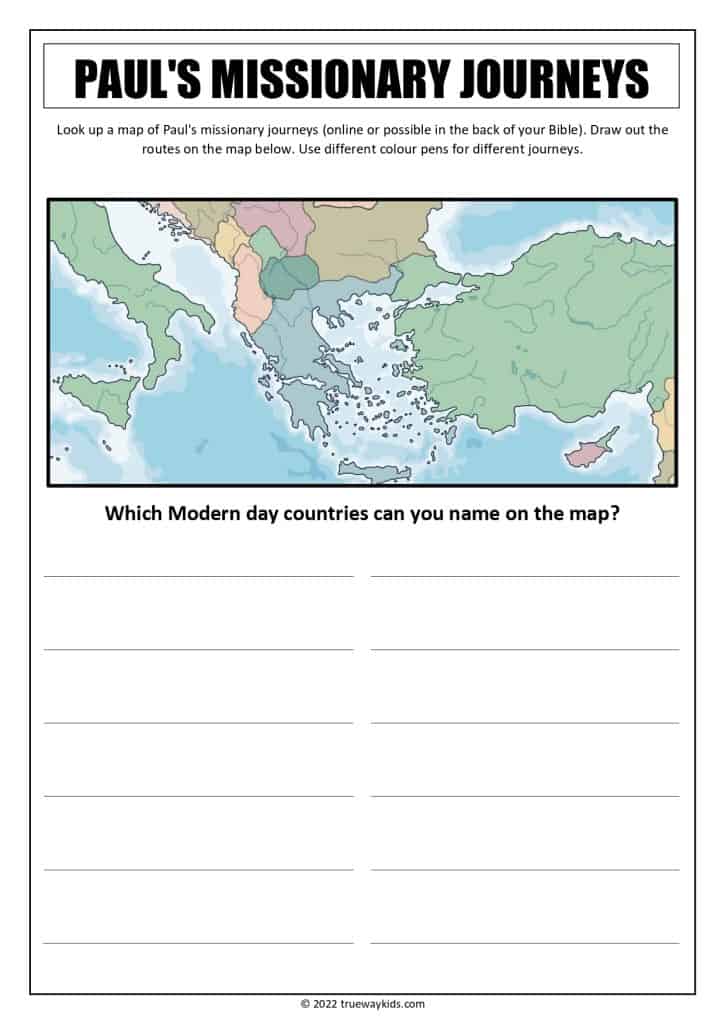

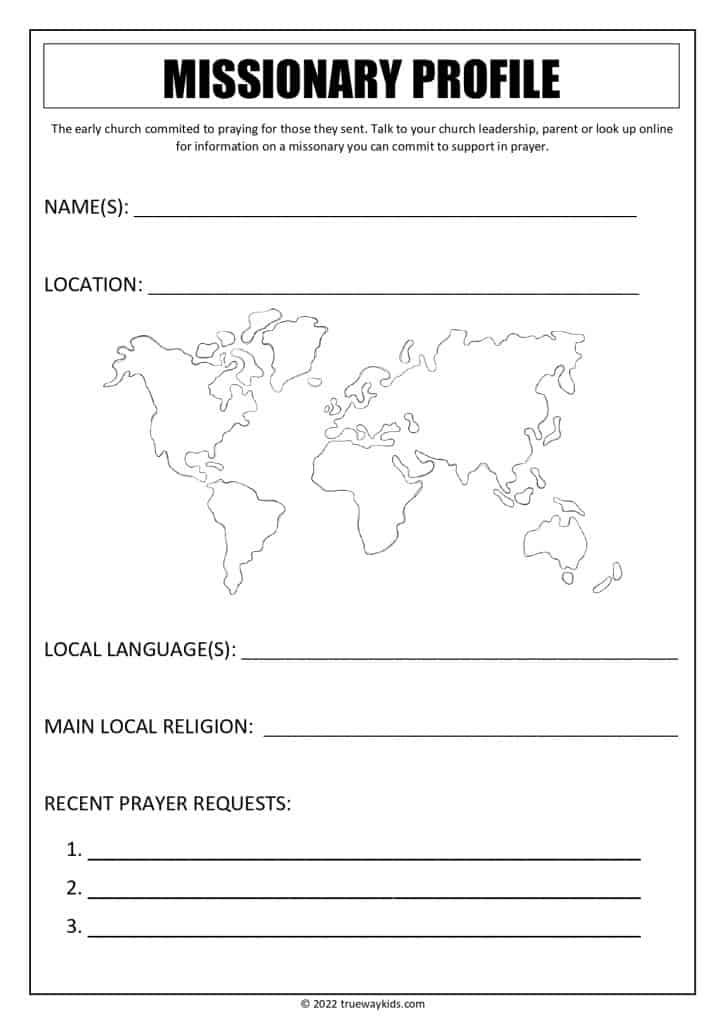
DOWNLOAD THE FREE PRINTABLE LESSON

View lesson for other age groups
Translations

Sign Up for FREE Weekly Bible Lessons!
Get a free printable Bible lesson delivered to your inbox every Friday—perfect for teaching and engaging with your children.
Every lesson includes lesson guides, story, worksheets, colouring pages, craft and more.
Simply enter your details below to start receiving these valuable resources for free!

